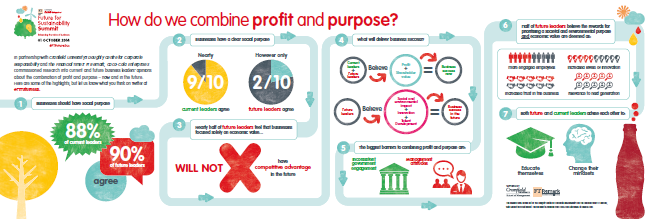Future of successful business blends profit with social purpose says Coca-Cola academic study
Written by Mark Sait
Posted on October 2, 2014
An academic study by Coca-Cola and Cranfield School of Management reveals sharp differences on business culture between current and future captains of commerce.
The study, Combining Profit and Purpose, was released at the Future for Sustainability Summit in London this week. The summit brings together current and future business leaders to explore the challenges of prioritising purpose and sustainability to create the optimum value for business and society.
It shows that while around nine in ten current CEOs and future business leaders believe businesses should have a social purpose, only a fifth of the younger generation believes companies are achieving this now.
That low figure is in stark contrast to 86% of current leaders who think businesses are already putting this into practice.
For us, the study indicates how far the debate on corporate sustainability and responsibility has shifted in the past few years. This is a process that will, in our view, only accelerate as evolving customer preferences, political and legal changes and environmental imperatives have an impact on how business is conducted.
The report interviewed 50 CEOs and almost 150 MBA, MSc students and recent graduates across Europe and it illuminates the shifting ground that underpins commercial life. Coca-Cola Enterprises (CCE) partnered with Cranfield Doughty Centre for Corporate Responsibility and The Financial Times’ FT Remark to complete the research on the future of sustainability.
A younger generation, influenced by the growing focus on sustainability and corporate responsibility, has definite and strong ideas about how to measure success.
Societal impact
The marked shift towards societal impact as a measure of worth is emphasised further as the study found that nearly half of future leaders believe companies which focus solely on economic value will not have a competitive advantage in the future, compared to only 16% of current leaders who said the same.
It’s clear that the pursuit of profit is not being fundamentally challenged, though. The reflections of the future leaders are on a more holistic view of corporate sustainability and success, which can only be beneficial. While both groups believe that business profit and the ability to provide shareholder value are the best barometers of business success today, a narrow view of commercial development is increasingly viewed as unviable by the future leaders.
The groups disagree on how business focus may change in the future. While the overwhelming majority of current CEOs feel that profitability and shareholder value will remain key in the future (94% and 88%, respectively), the findings suggest future leaders have higher expectations of the role business should play, claiming that societal and environmental impact (80%), innovation (61%) and development of future talent (57%) will be more important indicators of business success in the years to come.
The two groups also differ in opinion about the barriers to businesses combining social purpose with profit. Two-thirds of CEOs (66%) view external factors such as government and regulation as the main barrier, while the majority of future leaders cite internal factors, such as current management attitudes (55%).
John Brock, Chairman and CEO of CCE advises: “Forward-looking organisations are already focusing on how to balance profit and purpose, and there is clearly a growing expectation on businesses to do this.
“Today’s leaders play an essential role in integrating environmental and social issues into strategic decision making, but future generations have even higher expectations of business. It’s clear that social and environmental purpose will increase in importance in the years to come, and that collaborative innovation is the key to unlocking success.”
Engaged employees
Prioritising social purpose attracts many benefits, according to the study. More than three quarters of CEOs (78%) say it offers relevance to the next generation of customers and employees, and 70% claim it actually ensures business survival. Future leaders identified the key returns as more engaged employees (54%) and increased innovation (53%), while increased trust in business is also seen as a key advantage.
Professor David Grayson, Director of the Doughty Centre, advises: “While it’s not surprising to learn that social purpose is seen as a priority for business, the big challenge is to ensure more business leaders define the real purpose of their business, and identify how they are going to achieve that purpose. By developing clearly defined strategies and identifying new, disruptive approaches now, businesses can better ensure success and relevance in the future.”
The process of that definition is surely going to be a great challenge for all companies seeking to change in the most effective ways and the well-informed, guided reshaping of Corporate Social Responsibility strategies is crucial for this complex process to work.
